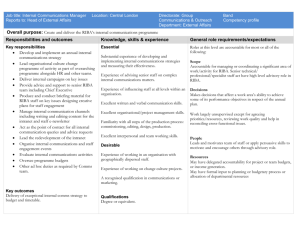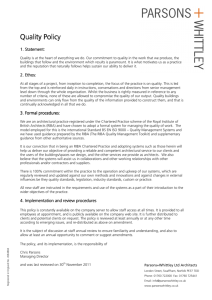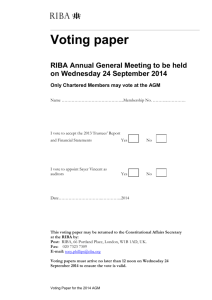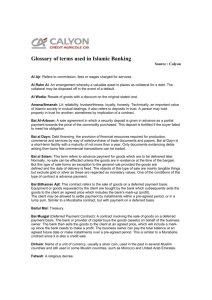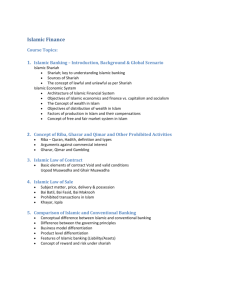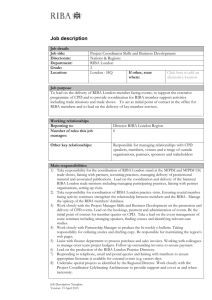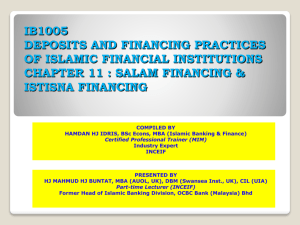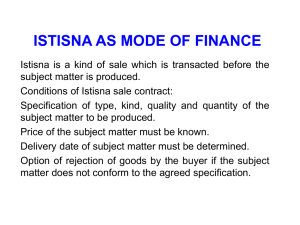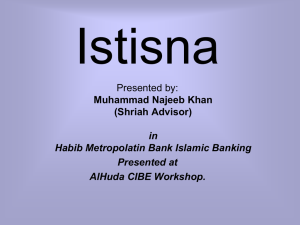Bank Reserves to Total Deposits Ratio
advertisement
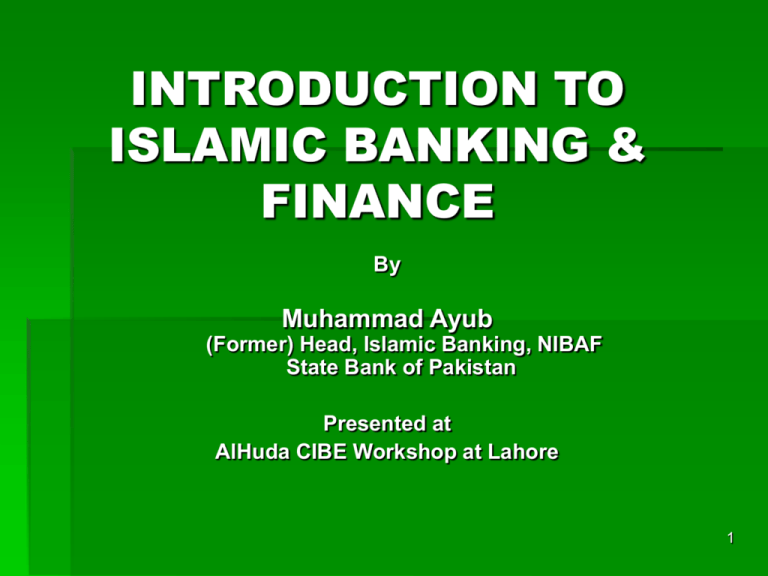
INTRODUCTION TO
ISLAMIC BANKING &
FINANCE
By
Muhammad Ayub
(Former) Head, Islamic Banking, NIBAF
State Bank of Pakistan
Presented at
AlHuda CIBE Workshop at Lahore
1
Topics to be Discussed
Why Islamic Banking?
The Prohibition and Concept of Riba
Key Misconceptions – General Myths
Features of an Islamic Bank – Overview
Overview of Islamic finance Modes
Shirkah – Musharakah and Mudarabah
Murabaha
Ijarah
Diminishing Musharakah
2
Islamic Banking?
Banking encompassing Islamic injunctions
To avoid:
Riba –Earning returns from loans and debts or
Selling debt contracts at discount
Gharar – Absolute Risk or Excessive uncertainty
in contracts, Gambling and chance-based
games (Qimar)
General Prohibitions
unethical practices
Shariah Compliance & Prudent Banking
3
Riba Prohibition
All revealed religions
Severe Prohibition in Quran $ Sunnah
Unanimity on Riba Prohibition;
Problem then?
Interpretation
Consensus
4
Quran Guides on Def of Riba
Financial Liability:
Qard (Loan) : to give anything in ownership of other
by way of virtue - same or similar amount of that
thing would be paid back on demand or at the
settled time.
Dayn (Debt) : Incurred by way of trade or rent or any
other credit transaction - ought to be returned at
the settled time without any profit.
Verse 2: 279 guides that whatever is over and above
the principal of loans or debts is Riba.
5
Riba?
All increases in wealth or benefits accruing
to a person without any labour, risk, or
expertise.
One who wishes to earn profit on his
monetary investment must bear the loss or
damage accruing to the business where his
money capital is to be used.
Nature of transaction important.
Trading- Bai- Risk taking, value addition
Leasing – Ijarah - Risk taking, value addition
Exchange transaction – Monetary transactions
Lending – a virtuous act; not a business
Hand to hand exchange of currencies
6
Misconceptions - Myths
Any Return on deposits is Riba;
Any prefixed return – Riba
Islamic banking: cost-less money
available – Approach of Businesses
Repayment of loans not a serious issue
–be waived of
Trade profit similar to interest on loans /
debts
7
Reality
Differentiating:
Trading, loaning and
leasing
Return by way of pricing of goods and their
usufruct needs to be fixed: permissible.
Islamic banking is also a business, It does
not mean availability of cost free money.
Repayment of debts is must.
Time value of money is accepted to the
extent of pricing of goods but not in the
form of conventional opportunity cost
concept.
8
Riba - Unanimity
Banu Thaqif of Taif, not to forego
interest on their receivables; Banu Amr
ibnal Moghirah refused to pay interest;
Referred to the H Prophet, the
Revalation came:
“O you who believe. Fear Allah, and give up the Riba
that remains outstanding if you are (in truth)
believer”. (11:278).
9
Riba - Unanimity (Contd)
“If you do not do so, then be sure of
being at war with Allah and his
Messenger. But, if you repent, then
you have your principal”. (11:279)
10
And if you repent, then you have your
principal. Wrong not, and you shall not be
wronged ”. {without inflicting or receiving
injustice}
11
And fear the day when you shall be brought back
to Allah.
Then shall every soul be paid what it earned
and none shall be dealt with unjustly.
12
Riba versus Bai
Those who protested and argued that lending on
interest was like an act of trade, were
admonished through revelation that while ‘trade’
was permitted, ‘riba’ was forbidden and in loan
transactions they were entitled to their principal
sums only.
13
Some other Myths
Credit and cash market prices of a
commodity must be same
Profit margin on credit sale by banks
resembles Riba.
Sharing vs. Non Sharing instruments:
Permissibility & Priority two
different aspects
Money can be rented like other assets
14
Reality
Profit margin that Islamic banks charge in their
trade operations is permissible if trading principles
given by Islam are properly taken care of.
PLS modes have preference but Debt creating
modes also permissible; Banks can use any modes
keeping in view the Risk Profile of the investors
and nature of business and cash flow of
entrepreneurs.
Money cannot be rented
15
They used to say that it is all equal whether we
increase the price in the beginning of the sale,
or we increase it at the time of maturity. It is
this objection which has been referred to in the
verse by saying “They say that the sale is very
similar to Riba.” (Ibn-Abi-Hatim)
16
Types of Riba
Riba Al-Fadl - sale transactions,
Quality premium in exchange of low
quality with better quality goods of same
kind; prohibited e.g. dates for dates,
wheat for wheat etc.
Riba Al-Nasia - loan transactions.
Riba Al-Nasia (Riba Al-Ouran) involved in
credit/delay; modern banking transactions
falls under Riba Al-Nasia,
17
Overall Consensus
Council of Islamic Ideology (CII): Preliminary Work
CII Report on Elimination of Interest from the
Economy (June, 1980) – Unanimously Endorsed
Representation of all Muslim sects in Pakistan
Justice Dr. Tanzil-ur-Rahman (J Afzal Cheema)
Mawlana Zafar Ahmad Ansari
Mufti Sayyahuddin Kakakhel
Khawaja Qamruddin Siyalvi
Mawlana Muhammad Taqi Usmani
Mawlana Muhammad Hanif Nadvi
Allama Syed Muhammad Razi
Mr. Khalid M Ishaq
18
Other Prohibitions
Compensation-based restructuring of debts
Selling debt contracts at discount Excessive
uncertainty in contracts (Gharar)
Gambling and chance-based games
Forward foreign exchange transactions
19
Gharar
Excessive uncertainty regarding subject matter
and the price;
Inadequacy and Inaccuracy of Information Uncertainty - lack of adequate value-relevant
information – Transparency and disclosure .
Any bargain in which the subject matter / result of
it is hidden; settlement risk / counterparty risk
involved
Only exception: "Salam” (forward sale with
prepayment)." and “Istisna´a” (order to
manufacture)
Rationale of this exemption.
20
Gambling
Maysir (game of chance) :getting something
too easily or getting a profit without
working for it.
Qimar includes every form of gain or
money, acquisition of which depends purely
on luck and chance.
All Lottery based prize Schemes covered
under the definition of gambling and Maysir.
21
Encouragements
Benevolence
Transparency and disclosures
Purification of income
Comprehensive and universal ethical
approach
Documentation
22
Welfare Economy Framework
Socio-economic Justice
Distributive Justice
Ethics and value system
Functioning of the Market & Role of the State:
Right of ownership, freedom of enterprise, over
seeing role of the State.
Transparency and disclosures
Competitive price mechanism
Creating additional value and sharing gains
Closer linkage between real economy & finance
Society happy both materially and spiritually.
23
Businesses / Modes of Arabs
Trading, Muzara’ah, Musaqat (Gardening with
Shirkah), Services (Ujrah and Ijarah) – The
Main businesses;
Barter and the Money based transactions;
Individual Businesses, with self capital or
arranged on Riba;
Loans, Debts (Credit /Future contracts –
Salam/Salf
Partnership
24
Impact of contracts
Bai: Definite transfer of ownership of goods against
payment of price-spot, delayed and forward; Profit
permissible
Ijarah (leasing): Transfer of usufruct of goods. Any
thing which cannot be used without consuming its
corpus, or whose corpus changes its form in the
process of its use, cannot be leased out like money,
edibles, fuel, etc. Rental permissible
Riba: Exchange transactions involving temporary
transfer of ownership of assets against payment. Any
return prohibited.
Qadr Hassan / Tabarrue: Temporary transfer of
ownership of goods/assets free of any payment;
25
What Islamic Banking?
Banking encompassing Islamic injunctions
To avoid:
Riba –Earning returns from a loan contract or
Selling debt contracts at discount
Gharar – Absolute Risk or Excessive uncertainty in
contracts, Gambling and chance-based games
(Qimar)
General Prohibitions
unethical practices
Shariah Compliance & Prudent Banking
Achieving the goals and objectives of an Islamic
economy.
26
A Paradigm Shift!
Conventional
Borrowing on
interest
Lending on
interest
Money – the
Subject matter
Services against
wages or
commission
Islamic
Trading- Shariah
Rules
Leasing
Doing other real
sector businesses
through sole
proprietorship or
Shirkah
Services against
wages or
commission
27
Principles of Islamic Finance
Lending a virtuous act – Not a business.
Prohibition of Riba and Gharar; permission of
trading.
All gains to principal not prohibited.
Deciding Factor: nature of transaction.
Profit to be earned by sharing risk and
reward of ownership through pricing of
goods, services or benefits.
Time has value that can be discounted only
through price; not in the form of interest,
sometimes negative value as well.
28
Profit linked with Liability
Ownership cannot be separated from the risk
of its loss
Al Kharaj Bil daman
The above implies that entitlement to return
from an asset is intrinsically linked to the
liability of loss of that asset
What that implies for the attitude towards
risk?
What that implies for time value of money?
in loans
in deferred sales
29
Cardinal Principles
(Contd)
Ability to cause ‘value addition’.
Differentiating: Trading, loaning and leasing
Ownership Transfer in: Sale of assets, Loans and
Leasing;
Any thing which cannot be used without consuming
its corpus, cannot be leased out like money, edibles,
fuel, etc.
Taking rent on leasing of asset permissible while rent
on loan is prohibited.
Repayment of loan- Must.
Husan al qada: Repaying a loan in excess of the
principal.
Debt contracts cannot be sold at discount.
30
Cardinal principles
Risk and return / rights and liabilities must go
side-by-side;
The subject of exchange has to be valid and
should not involve Gharar;
Notional assets stand no where in Islamic
finance;
Non-existing assets can become the subject
matter of exchange with the conditions
applicable to Salam;
The main objective of exchange transactions
has to be completion of the exchange process
from the both sides.
31
Alternative Financing Principles
Participation and sharing principle
Deferred trading principle
Interest free loans
Combination of contracts
32
Wealth and trading rules
Forms of
Wealth (Mal)
Goods, durable
assets, shares
of companies
Classification
Non-debts
Trading rule
Market prices
Services
Pooled assets
are traded in
accordance
with the rule of
the dominant
assets
Usufructs
Money, gold
and silver
Debts
Money
Pure debts
Sarf
Hawala al
dayn
33
Exchange Rules
Different for different contracts and types of wealth:
Goods, Durable assets, Shares representing pool
of assets - Market based pricing
Gold silver or any monetary units (Athman) –
Rules of Bai al Sarf
Usufruct and services (Leasing/ Services)
Loans/Debts – Repayment or Assignment of the
same amount.
Well-Known Injunction on exchange of six
commodities: Gold, Silver, Wheat, Barley, Dates and
Salt.
34
Exchange Rules (Nawawi)
Illah (Effective Cause of prohibition): Unit of value
and Edibility
When underlying illah is different, short fall/excess
and delay both are permissible, e.g. sale of gold for
wheat.
When commodities of exchange are similar, excess
and delay both are prohibited, e.g. gold for gold or
wheat for wheat, Rupee for Rupee, etc.
When commodities of exchange are heterogeneous
but the illah is same, as in the case of gold for silver
(medium of exchange) or wheat for rice (edibility),
then excess/deficiency is allowed, but delay in
exchange is not allowed.
35
Exchange of Currencies
Contd)
Special rules for exchange of monetary
values.
Currency Futures: Some scholars forbid them
while others distinguish between the two
cases:
First, where one currency is delivered on spot and
the other is delayed - forbidden.
Second, permitted, involves the future exchange of
both currencies at the previously agreed rate.
36
Banking - A Business
Banking or Benevolence ?
Principle of Islamic banking business: Sharing of
profit and loss on post facto basis arising from:
i. (Deferred) Trading– profit margin for the
seller
ii. Rentals on leased assets
iii. PLS
iv. Combination of contracts
Return free (loans)
37
Main Financial Contracts
A. Debt creating Modes (Low Risk Category)
1. Qard Al-Hasan (interest-free loan)
2. Bai Muajjal (Price deferred sale)
3. Murabaha and Musawama
4. Salam (Commodity sale)
5. Istisna´a ((Order to Manufacture)
B. Semi-debt Modes
1. Ijara
C. Sharing or Non-debt Modes (Full Risk
Category)
1. Musharaka (Close to Venture Capital)
2. Specific Purpose Mudaraba
3. General Purpose Mudaraba
38
conditions for Valid sale
General Rule:
Commodity should have come into
existence.
It should be in ownership of the seller.
The commodity should also be under
physical or constructive possession of
the seller.
Two exceptions to this rule- Salam & Istisna´a
39
Contract of Valid Bai
Valid Bai
Price
Thaman
Subject Matter
(Mabe'e)
Delivery/Conveyance
(Qabza)
Known
(Maloom)
Existent/
existable
Physical
(Haqiqi)
Certain
Muta'ayyan
Valid for
Ownership/
Possession
Constructive
(Hukmi)
Ownership/
risk of
seller
Valuable
Useable
(not prohibited
in Shariah)
40
Principles of Credit Sale
Installments Sale permissible, even if the deferred
price exceeds the spot price.
Deferred prices can vary so long as price not
finalised.
Sale cannot take place until the parties agree to a
particular price & mode of payment.
Not permissible to fix the spot price on cash basis,
then to charge interest expressly tied with different
periods.
Commercial
papers
are
lawful
types
of
authentication of a debt by putting it down in writing;
- Treated by Shariah near to mandatory.
41
Two main prohibited Sales
Bai al inah – Buy-back arrangement
Creditor purchasing assets from debtor
on cash and selling back to him on credit
• Bai al Dayn - sale of debt
• Trading of debt securities
• On face value- Hawalah - Permissible
• On premium or discount – Not
permissible
42
Rules in Murabaha
Basic concept: Sale on mutually agreed profit margin
on the known cost of goods; payment of sale price is
deferred.
Real, tangible goods to be traded and not papers of
debt or credit documents.
Murabaha cannot be used as mode in case no
commodity is purchased by the client.
Buy-back arrangement: not allowed.
MUAJJAL; Credit price may include margin of mark-up,
taking into consideration the deferred payment. As a
debt, no return can be charged on the amount of
43
Note/Bill.
MURABAHA
Contd
Seller having a good title
physical / constructive possession.
Defaulter: different punishments, penalty for
charity.
Solatium through court (out of penalty).
Client as Agent to the Bank;
Better to have a third party as agent;
Roll-over.
Asset price Risk or commodity risk ( client
might not take delivery);
Market risk,
Credit risk,
Reputational Risk
44
Rules in Musawamah
A general kind of sale: Price bargained without any
reference to the price paid or cost incurred.
Seller not obliged to reveal his cost.
Different from Murabaha in pricing formula only.
Musawamah can be used for big single deals.
45
Salam and Parallel Contracts
(Future Sale)
Prepayment of price in full for goods to be delivered in
future.
Allowed by Holy Prophet (SAW) himself to meet
farmers’ money need.
Banks will receive contracted commodities, not money.
Parallel Salam: a bank can sell a commodity purchased
through Salam for even the same date of delivery or the
quantity;
As long as the two contracts are not made
conditional on each other.
46
Purpose of Salam
To meet the need of farmers who need money
to grow their crops and to look after their family
up to the time of harvest.
To finance someone who is in need to grow something
or acquire something for further sale.
To meet the need of traders for import and
export business.
The buyer also enjoys a lower purchase price, since he
pays in advance.
Acceptance of Time. Value of Money through pricing of
goods
47
Salam Conditions
Fungible – homogeneous goods
not where delivery has to be simultaneous,
e.g. Gold, silver or currencies.
Date and place of delivery must be specified
in the contract.
In case of a number of commodities, the
amount and delivery period should be
separately fixed.
48
Salam Conditions Contd…
The bank can sell the Salam Commodity
through a parallel contract of Salam for the
same date of delivery.
For a parallel Salam, the two contracts should
be independent and separately enforceable.
Bank can also obtain a unilateral ‘promise to
purchase’ from a third party.
Agency
To sell anywhere in the market
49
Istisna’a (Order to Manufacture)
Istisna’a, an agreement for order to manufacture,
culminating into a sale at an agreed price;
The things to be manufactured must be known and
specified to the extent of removing any ignorance
or lack of knowledge of its kind, type, quality, and
quantity.
Price be known in advance that can be readjusted
only by mutual consent of the parties.
50
Istisna’a
(Contd)
Prepayment not necessary in Istisna’a
Not
necessary
for
seller
to
manufacture the commodity himself
Parallel Istisna’a contract; without any
condition attached to the original
Istisna’a contract.
51
Salam, Istisna Differentiated
ISTISNA’
The subject on which
transaction of Istisna’
is based, is always a
thing which needs to
be manufactured.
Price must be fixed,
but need not to be
paid in advance
SALAM
Subject can be
anything; Agri
produce,
Manufactured goods
all units of which are
normally of the same
.
Price has to be paid
in full in advance
52
Salam, Istisna Differentiated
ISTISNA’
Time of Delivery
does not have to be
fixed ; can be
delivered before the
settled time.
The contract can be
cancelled before the
manufacturer starts
working.
SALAM
Time of delivery is an
essential part of the
sale
The contract cannot
be cancelled
unilaterally.
53
Distinction of Istisna
Penalty on default
Shart-e-Jazai
54
Ijarah Rules
Subject Matter:
The corpus of the leased asset should exist till the
expiry of lease period;
The corpus of the leased asset should remain in
the ownership of the lessor during the whole
period of lease; in case of Shirkah pro-rata
ownership.
The lessor must accept responsibility of any
defect in leased asset (without negligence of the
lessee) which hinders the intended use of asset.
Sale – Separate and independent contract
55
Flexibility in Ijarah
Fixed Vs. variable / floating return
Time of execution of the contract
Potential in Sukuk Issue
56
Shirkah - Partnership
Commingling by two or more persons
either their money or work or obligations
to earn a profit or a yield or appreciation in
value and to share the loss if any
according
to
their
proportionate
ownership.
Musharakah, Mudarabah, Diminishing
Musharakah
57
Types of Partnership
Musharakah: All partners provide funds not
necessary equally, and all have right to wok;
Shirkatulmilk: Partnership in Ownership
Automatic –compulsory
Arranged - Optional
Shirkatulaqd: General / Commercial
partnership – for joint business
Musharakah – general contractual
partnership
One party provides capital and the other
management
58
Profit / Loss Sharing
Profit distribution: as per agreed ratio;
Loss: in proportion to the investment of
each party.
Profit allocation: in percentages of earning
(profit) and not a sum of money or a percentage
of the capital or investment.
No guarantee of the capital
Loss?
59
Structures of Musharakah
Permanent Musharakah: partners can sell - as in
case of Shares of Joint Stock Companies.
Temporary (Redeemable) Musharaka: for limited
time period, e.g. PTCs or Musharakah based
TFCs; After agreed time period(s),
Diminishing Musharakah: one partner promises to
buy the share of the other partner gradually until
the title to the property is completely transferred to
him.
60
Reference Rates
Reference rates needed for executing and pricing the
contracts.
Different scales
contracts.
for
different
kinds
of
financial
For Conventional finance: Only one reference rate
(interest rate),
Islamic finance: debt/semi-debt contracts and non-debt
(equity) contracts,
Therefore, two reference scales are needed:
• Price mark up/rent reference scale
• Share ratio reference scale, through the Central
Bank Mudaraba ratio or Interbank Mudaraba ratio.
61
Challenges
Parallel Functioning of the two systems – the
greatest challenge
Creating Awareness
Catering to the education and training needs.
Development of Shariah compliant financial
instruments - for SLR, Govt. Financing.
Changes in legal and taxation structure.
Responsibility of advising, coordination and
leadership by any institution/authority for the
transformation process.
Commitment at all levels.
Ultimate Objective: To establish banks that are
Shari’ah compliant, enjoy depositors’ confidence,
and are efficient and stable!
62
Key Areas in Future Direction
Justifiable profit distribution mechanism
Focusing asset management
Potential scope of Shari’ah complaint
financial engineering
Financial stability
Shari’ah complaint risk management tools
Corporate governance, transparency and
disclosures requirements
63
Thanks
64
